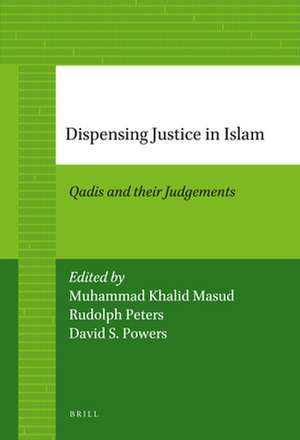Dispensing Justice in Islam: Qadis and their Judgements: Brill's Paperback Collection / Middle East, Islamic & African Studies
Editat de Muhammad Khalid Masud, Rudolph Peters, David Powersen Limba Engleză Paperback – 22 feb 2012
Originally published in hardcover.
Preț: 266.90 lei
Nou
Puncte Express: 400
Preț estimativ în valută:
51.07€ • 53.32$ • 42.27£
51.07€ • 53.32$ • 42.27£
Carte indisponibilă temporar
Doresc să fiu notificat când acest titlu va fi disponibil:
Se trimite...
Preluare comenzi: 021 569.72.76
Specificații
ISBN-13: 9789004226838
ISBN-10: 9004226834
Pagini: 594
Dimensiuni: 160 x 240 x 33 mm
Greutate: 0.98 kg
Editura: Brill
Colecția Brill
Seria Brill's Paperback Collection / Middle East, Islamic & African Studies
ISBN-10: 9004226834
Pagini: 594
Dimensiuni: 160 x 240 x 33 mm
Greutate: 0.98 kg
Editura: Brill
Colecția Brill
Seria Brill's Paperback Collection / Middle East, Islamic & African Studies
Notă biografică
Muhammad Khalid Masud, Ph.D. in Islamic Studies, McGill University, formerly Academic Director, ISIM, Leiden is Chairman, Council of Islamic Ideology, Pakistan. He has published extensively on Islamic law and social change. His recent publications include Shatibi’s Philosophy of Islamic Law (1996), the co-edited work Islamic Legal Interpretations (1996), and the edited volume Travelers in Faith (Brill 2000).
David S. Powers, Ph.D., Islamic History, Princeton (1979). Professor of Arabic and Islamic Studies at Cornell University since 1979; editor of the journal Islamic Law and Society (Brill); author of Studies in Qur’an and Hadith: The Formation of the Islamic Law of Inheritance (University of California Press, 1986); and Law, Society and Culture in the Maghrib, 1300-1500 (Cambridge); co-editor of Islamic Legal Interpretation: Muftis and the Fatwas (Harvard, 1996). He has published articles in Arabica, Studia Islamica, Journal of the American Oriental Society, Journal of Near Eastern Studies, Comparative Studies in Society and History, Continuity and Change, Law and Society Review.
Rudolph Peters, Ph.D., Islamic Studies, University of Amsterdam (1979). Professor of Islamic Studies at University of Amsterdam; co-editor of the series Studies in Islamic Law and Society (Brill); author of Islam and Colonialism: The doctrine of jihad in modern history (Mouton/Walter de Gruyter, 1979), Jihad in classial and modern Islam (Princeton, Wiener, 1996), Crime and punishment in Islamic law (Cambridge University Press, 2005). He has published articles in Islamic Law and Society, Die Welt des Islams,International Journal of Middle Eastern Studies, Mediterranean Studies and Annales Islamologiques.
David S. Powers, Ph.D., Islamic History, Princeton (1979). Professor of Arabic and Islamic Studies at Cornell University since 1979; editor of the journal Islamic Law and Society (Brill); author of Studies in Qur’an and Hadith: The Formation of the Islamic Law of Inheritance (University of California Press, 1986); and Law, Society and Culture in the Maghrib, 1300-1500 (Cambridge); co-editor of Islamic Legal Interpretation: Muftis and the Fatwas (Harvard, 1996). He has published articles in Arabica, Studia Islamica, Journal of the American Oriental Society, Journal of Near Eastern Studies, Comparative Studies in Society and History, Continuity and Change, Law and Society Review.
Rudolph Peters, Ph.D., Islamic Studies, University of Amsterdam (1979). Professor of Islamic Studies at University of Amsterdam; co-editor of the series Studies in Islamic Law and Society (Brill); author of Islam and Colonialism: The doctrine of jihad in modern history (Mouton/Walter de Gruyter, 1979), Jihad in classial and modern Islam (Princeton, Wiener, 1996), Crime and punishment in Islamic law (Cambridge University Press, 2005). He has published articles in Islamic Law and Society, Die Welt des Islams,International Journal of Middle Eastern Studies, Mediterranean Studies and Annales Islamologiques.
Recenzii
“This volume makes a significant contribution to the growing number of studies that utilize court records and anthropological and ethnographic research to analyze legal practice in the shariʿa court’s socio-legal setting. […]The strength of this volume lies in the editors’ choice to compile a collection of scholarship that reflects on common themes across disciplinary boundaries.”
Karen Kern in MESA - RoMES 44.1 (2010).
"[...] this volume represents the single most important available source for the analysis of qāḍīs and their role in
the operation of the law in Muslim contexts. A competitor volume does not exist."
Robert Gleave in Journal of Islamic Studies, 2011.
"... an extremely valuable contribution to the reflection on, and hopefully also to the practice of, the institution of the qāḍī-s."
Piet Horsten in Islamochristiana 38 (2012).
“The volume is thoughtfully put together, reasonably complete, rich, and suggestive, corrective of any number of misinformed assumptions about Islamic law in modern literature that had been based on a thin reading of formal-theoretical texts on legal doctrine, and a welcome first step in the passage of the field of Islamic legal practice to the age of maturity.”
Ovamir Anjum in Ilahiyat Studies 5.2 (2014), 261-264.
doi: 10.12730/13091719.2014.52.113
Karen Kern in MESA - RoMES 44.1 (2010).
"[...] this volume represents the single most important available source for the analysis of qāḍīs and their role in
the operation of the law in Muslim contexts. A competitor volume does not exist."
Robert Gleave in Journal of Islamic Studies, 2011.
"... an extremely valuable contribution to the reflection on, and hopefully also to the practice of, the institution of the qāḍī-s."
Piet Horsten in Islamochristiana 38 (2012).
“The volume is thoughtfully put together, reasonably complete, rich, and suggestive, corrective of any number of misinformed assumptions about Islamic law in modern literature that had been based on a thin reading of formal-theoretical texts on legal doctrine, and a welcome first step in the passage of the field of Islamic legal practice to the age of maturity.”
Ovamir Anjum in Ilahiyat Studies 5.2 (2014), 261-264.
doi: 10.12730/13091719.2014.52.113

